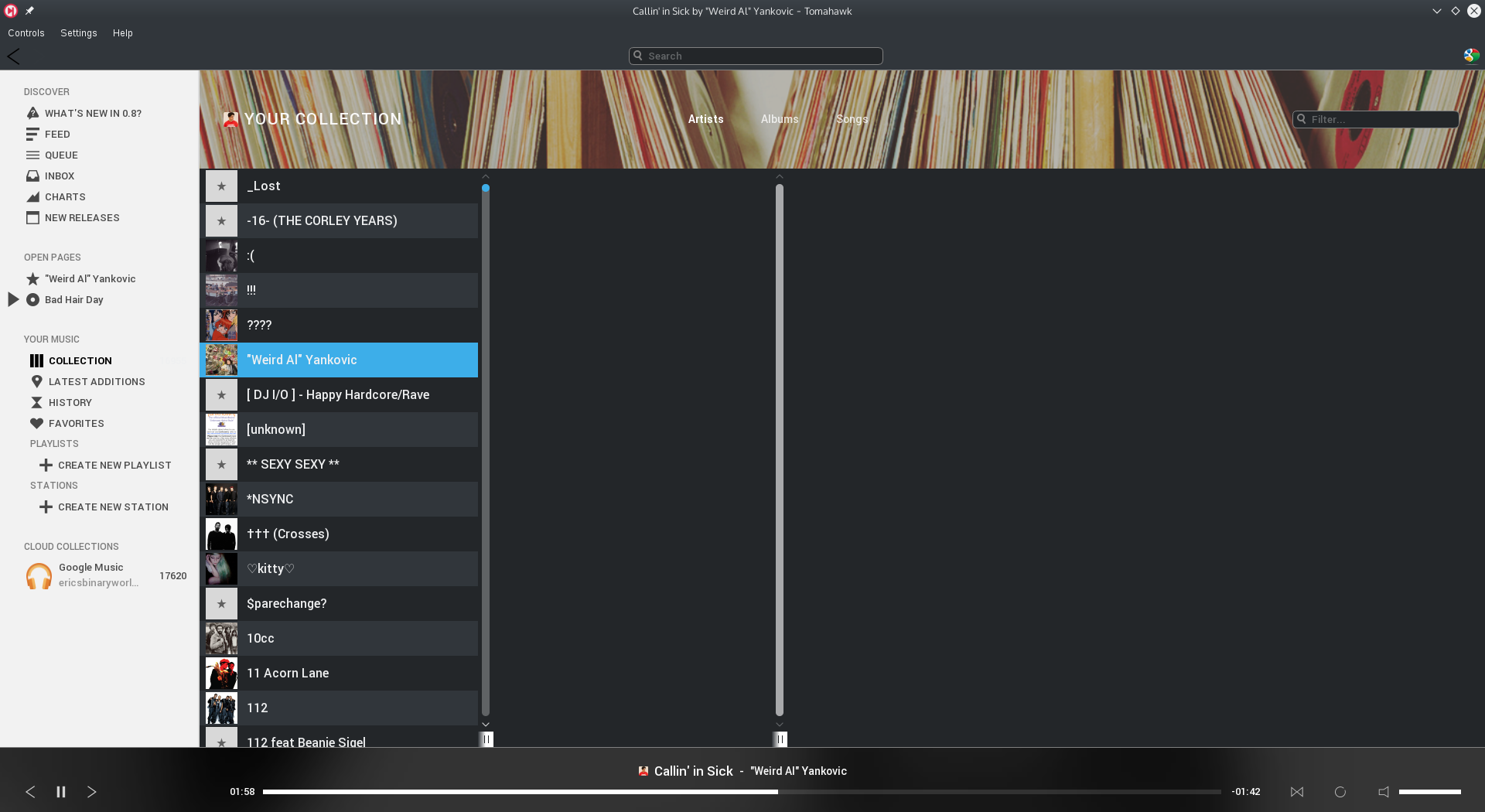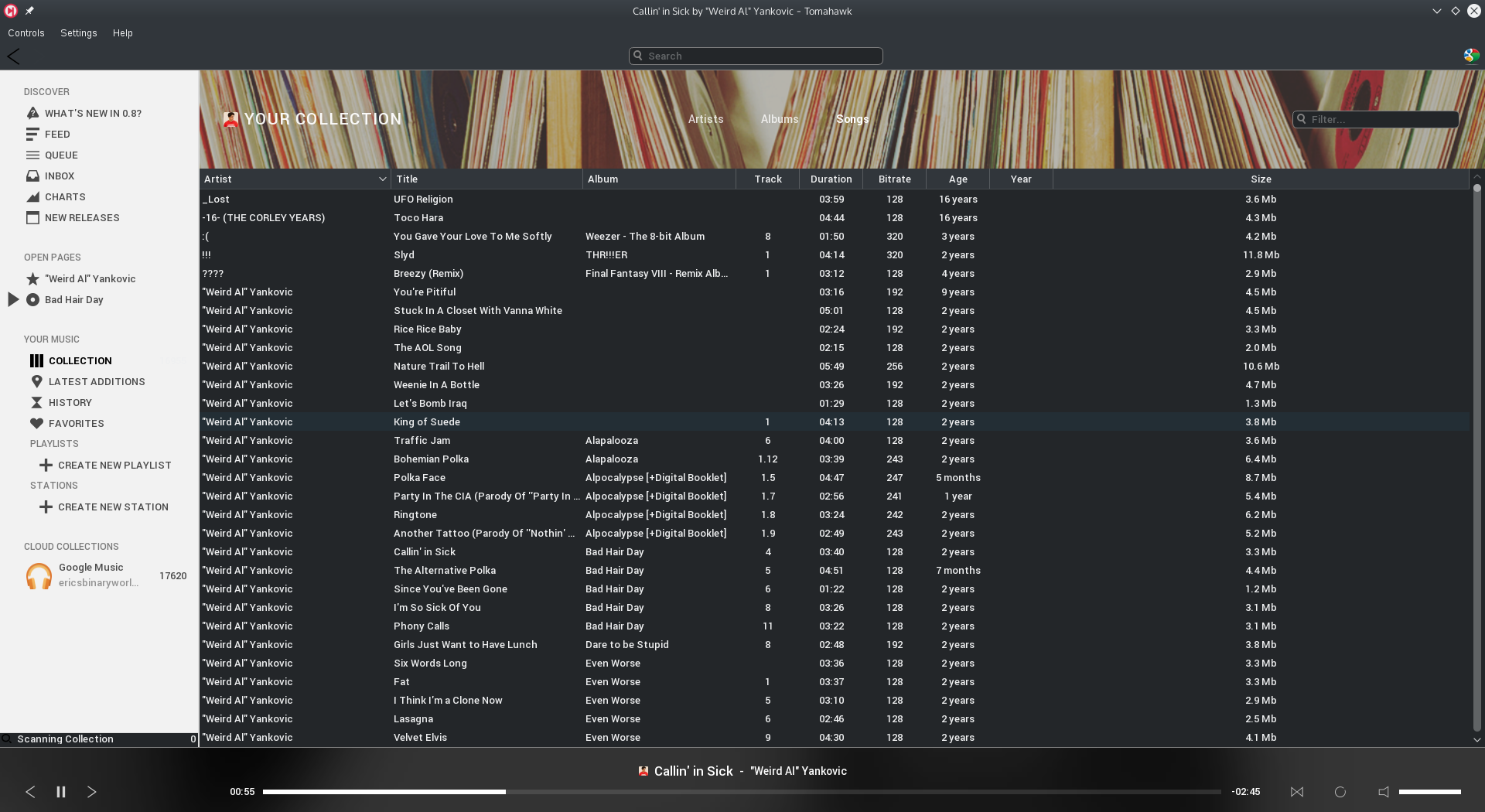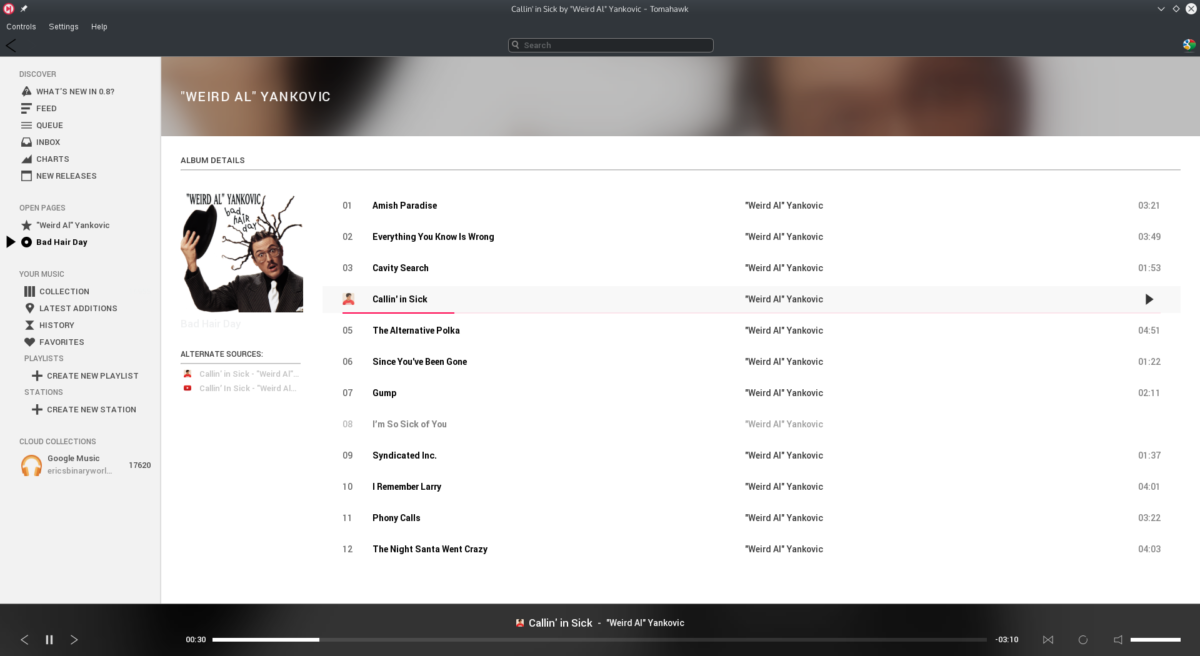It’s been a long time since I last took a look at an innovative music player. Back in 2006 I explored Songbird ) and in 2008 I looked at some of the unique features over two posts: Taking Another Look at Songbird and Play the Web. The ability to grab MP3s off of sites, in particular seemed to be a great way to take advantage of the music blogs as a way to discover new music. Some of this has been superseded by certain browser plugins that can grab all files off a webpage based on regular expressions. In the last decade, there has been a big change in the way most people experience digital music. Most people have stopped buying music in favor of either using Youtube or a subscription service like Spotify, Rdio, Amazon Prime Music, or Google Music.
I continue to say that there is a benefit in owning music. For one thing, as we grow older, we tend to add less new bands and albums to our repertoire. So the cost of of albums is less than $10/month for these services. (Although, if they reach the predicted equilibrium price of $5/month, I think it becomes cheap enough that it becomes a “why not?” subscription). Second, some of the bigger artists have decided not to be on these services or to only be on one of them. If this balkanization becomes mainstream, it’ll be as annoying as the movie and TV business with a subscription needed to three or four services needed to get it all. So if you want Taylor Swift, you don’t have a choice – you need to own some music. But not only am I seemingly in the minority, with Google Music you can have access to all your purchased music and (for a fee) all the rest as well.
However, even I have been making big use of Spotify at work since their web-only free tier actually offers a lot of benefits. I can pick any song I want and Google Music is blocked at work. So I’ve become strategic in my purchases (which, I think, is why the music industry has been turning so negative against Spotify and its brethren). Can I satisfy my musical “needs” by listening to a song or artist on Spotify at work (at home I’d mostly be using mobile and without payments you’re stuck in random listening mode – which can be quite annoying) or do I want to buy the album so that I can listen to it whenever I want – including in the car via Google Music? On the assumption that Amazon Music has a lot of the same music (again, I have no idea how much balkanization there is in the music world), I’ve already got Prime. And there’s always Youtube if I want to go searching there. So if I want to listen to a song or an artist, do I want to have to remember where I can listen to it?
Enter Tomahawk. This music player has been around since 2011, when it acquired a lot of accolades and then everyone seemed to stop talking about it. The website stopped being updated about a year ago which is when they had their last official release, 0.8.4. However, I checked on github and development continues, even if it’s been forever since their last release. The reason I make a big deal about this is two-fold. First of all, projects (whether open source or closed source) can die. Programmers move on or the need it was trying to solve is eliminated. Second, most distros only package releases — Fedora is stuck on 0.8.4 in the repositories. And many people would rather use releases than nightlies.
So what Tomahawk does is to unify all your music sources so that if you search for, say, Five Iron Frenzy, it will look in your local music, Spotify, Amazon Prime Music, Soundcloud, Beats music, Youtube, and a bunch of other places to present you with all the music available. It’s pretty awesome. I don’t need to remember if I have a song purchased or in Spotify (or somewhere else). Also, importantly for me, it will also Scrobble the music no matter where it came from. (That is, send the stats to personal charts website, Last.fm)
More importantly for me, as a lover of music, is the music discovery aspect of Tomahawk. You can use it to discover music in a number of ways. (This could be its most powerful killer app if it could reach 1.0 and become accepted among the musical cognoscenti) First of all, you could become “friends” with someone and it shows you their library. This is the biggest thing I miss from the original Napter and Kazaa apps. Sure, it was amazing in those early days to have access to free music, but the thing I loved to do most was to explore users and see what music they had. I discovered a lot of music that way before it was all closed up because of the copyright infringement. Tomahawk re-enables this feature without the problematic copyright infringement. If I’m following my brother and notice something interesting, I can click on it and if it’s available on one of my services – Spotify, Google Music, etc – I’ll be able to listen to it and the artist still gets royalties! Win/Win! And I have discovered a lot of new artists from my little brother as we tend to listen to different stuff so I miss out on artists from not following the scene. Also, it doesn’t have to be an active thing. They have a feature called “inbox” where Dan could place a song he wanted me to check out. Second, Tomahawk has a feature to see the charts from various places – iTunes, Billboard, Last.fm, etc – and it’ll find music based on that. So, as I mentioned before, as we get older we tend to disconnect from the places where people find out about new music. So I could periodically check out the top 200 on Billboard and see if I have a new favorite artist there. Finally, the day before I wrote this I was able to use Tomahawk to listen to some music from an artist I’d only heard one song from before. Then I looked at related artists and discovered even more artists I’d never heard of before, but which I liked.
A quick aside that I didn’t see fitting anywhere else – this program is actually pretty awesome for a non-tech person like my wife. The interface makes sense and it provides exactly the functionality she would want – find me this song – I don’t care from where. Right now she often complains about needing to switch from Google Music to Pandora to Youtube to find what she’s looking for.
Ok, so let’s look at my use of 0.8.4 on Fedora. (More on why I’m using an old version later)

This version has a bug with this view where my albums don’t show up. But when I go to song view, it’s all there:

Interestingly, in Google Music, the other view works perfectly:

I went and opened up Weird Al’s Bad Hair Day and here’s the view I got:

So, among the sources I was able to add in 0.8.4 – Google Music, Soundcloud, and Youtube – it was able to fill in the whole album. I only had about 3 or so of those songs. All the rest were found on Youtube. Only track 8 couldn’t be found in any of those sources. I wasn’t able to add Amazon Music or many of the others because they don’t work with older versions like 0.8.4. (Another reason they need more stable releases so we can have more up to date stuff in the Fedora repos)
Given the love the developers of Tomahawk have for music and music discovery, I have high hopes for their Last.fm replacement, Hatchet. For now, it just Scrobbles music and provides minimal ability to follow others and see what they’re listening to. It doesn’t have as many resolvers as the Android app or the desktop app – I don’t know if more are coming or of it’s a limitation of the API policies of the sites they’re collecting from. Still, if they can ever get it out of beta, it could potentially be what everyone is disappointed that Last.fm didn’t become – a great place to discover new music.
Speaking of the Android app, it works fairly well. It’s missing a couple key things. First of all, it needs to be able to Scrobble to Last.fm. Until Hatchet takes off a bit more, I’m not ready to abandon Last.fm in favor of it. Sure, Last.fm has been losing money for CBSi (which is dumb, they should be somehow making money off of all that play data) and might go away. But Hatchet isn’t even publicly launched yet. Second, it needs a few settings to, say, only use Wi-Fi if that’s important to me. (And with bandwidth restrictions on the cell network, it’s important to many).
I tried compiling the latest version in git for Fedora last night. I spent a couple hours at it and had to give up when I couldn’t figure out what was going wrong. Mostly it seems that the Linux devs are working on Ubuntu and/or Debian and so some of the libraries were in the wrong spot. In case any of the devs read this far, I’d like to advocate more releases with smaller dev cycles like Firefox/Chrome/etc so that we can get up-to-date packages on non-Debian platforms (or maybe have a git-based COPR repo). I’ve done quite a bit of compiling in my time (even creating RPMs) so if I couldn’t get it to compile, that means they’re limiting the reach of Tomahawk. To get Cmake to finish I had to create a symlink in /usr/lib/include for echonest with echonest5.
So, as we come to the end, I’d like to say that I’ve learned a lot and matured a lot in the decade since I covered Songbird. While Tomahawk is awesome and SHOULD end up the main music player for anyone who cares about music, I know that the best tech doesn’t always win. (See Amiga or BeOS) Additionally, Tomahawk only works by the grace of the APIs of others. After a nice near-decade when the Internet was being all awesome and open-sourcey, it seems that everyone wants to be proprietary again. Twitter took away its APIs. Facebook and Google have moved away from Jabber/XMPP. The current “truth” is that you have to trap everyone in your walled garden. We’re back in the era of AOL and keeping people off the real Internet. And so Facebook is making it so you can do everything from reading the news to ordering a pizza without ever leaving FB. The websites that Tomahawk uses for resolving where to grab music from mostly need you to have a subscription (Spotify, Amazon Prime Music, Tidal) or be signed in (Google Music). So they’re already getting money from you. And Tomahawk doesn’t hide where the music’s coming from. An icon lets you know that it’s from Spotify or Amazon. So if you know where the music’s from and you’re already paying, you’d think that the businesses wouldn’t care. But, like I said, they don’t seem to think rationally. If they were to remove that functionality, Tomahawk would fall apart.
In conclusion, this music player has a lot of awesome potential. It’s been working to get there for the past 4-5 years. If they can pick up the pace of releases and the APIs don’t close up to them, they could become THE music app to have on the desktop, tablet, and phone. I wish them luck.

